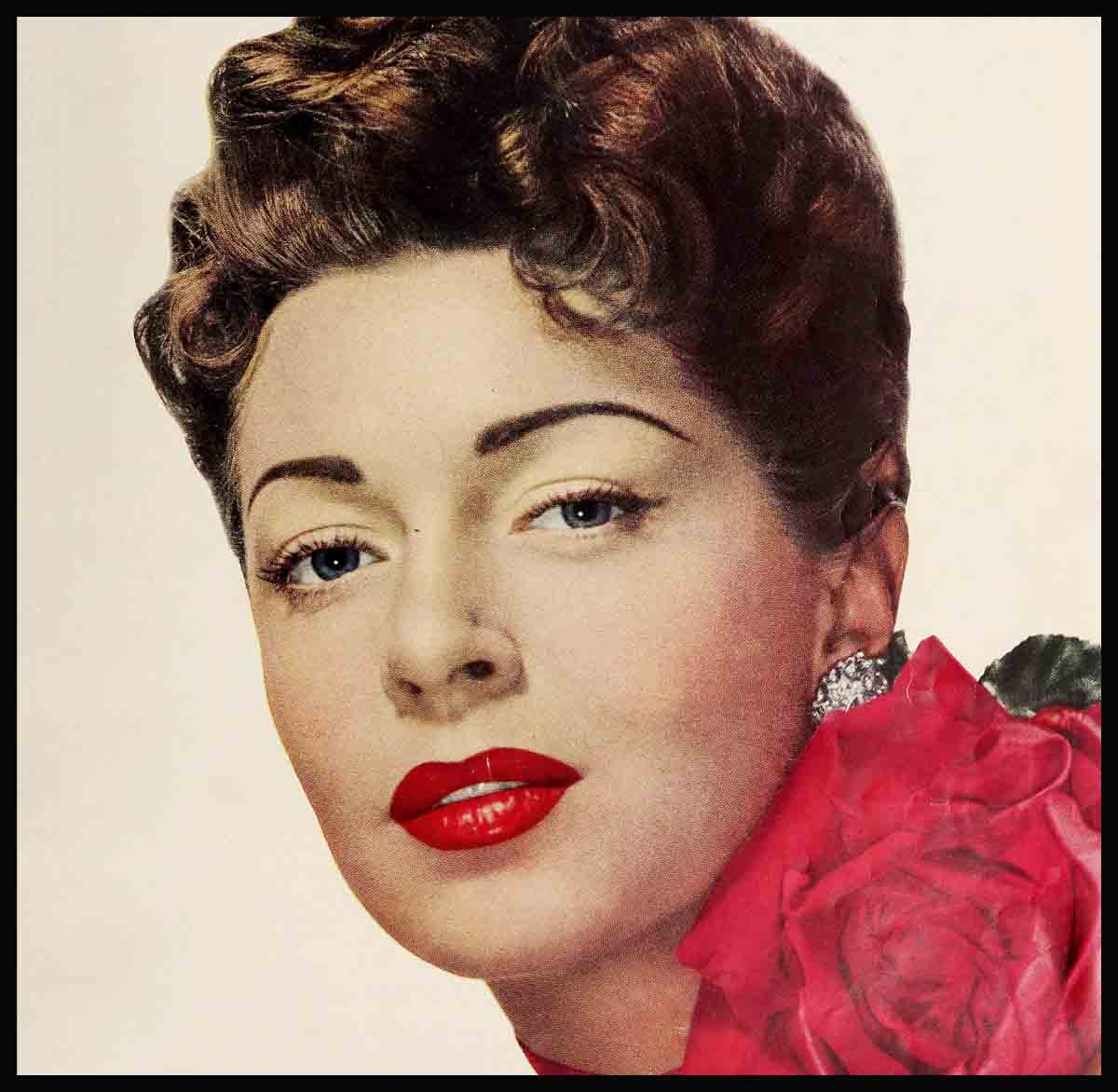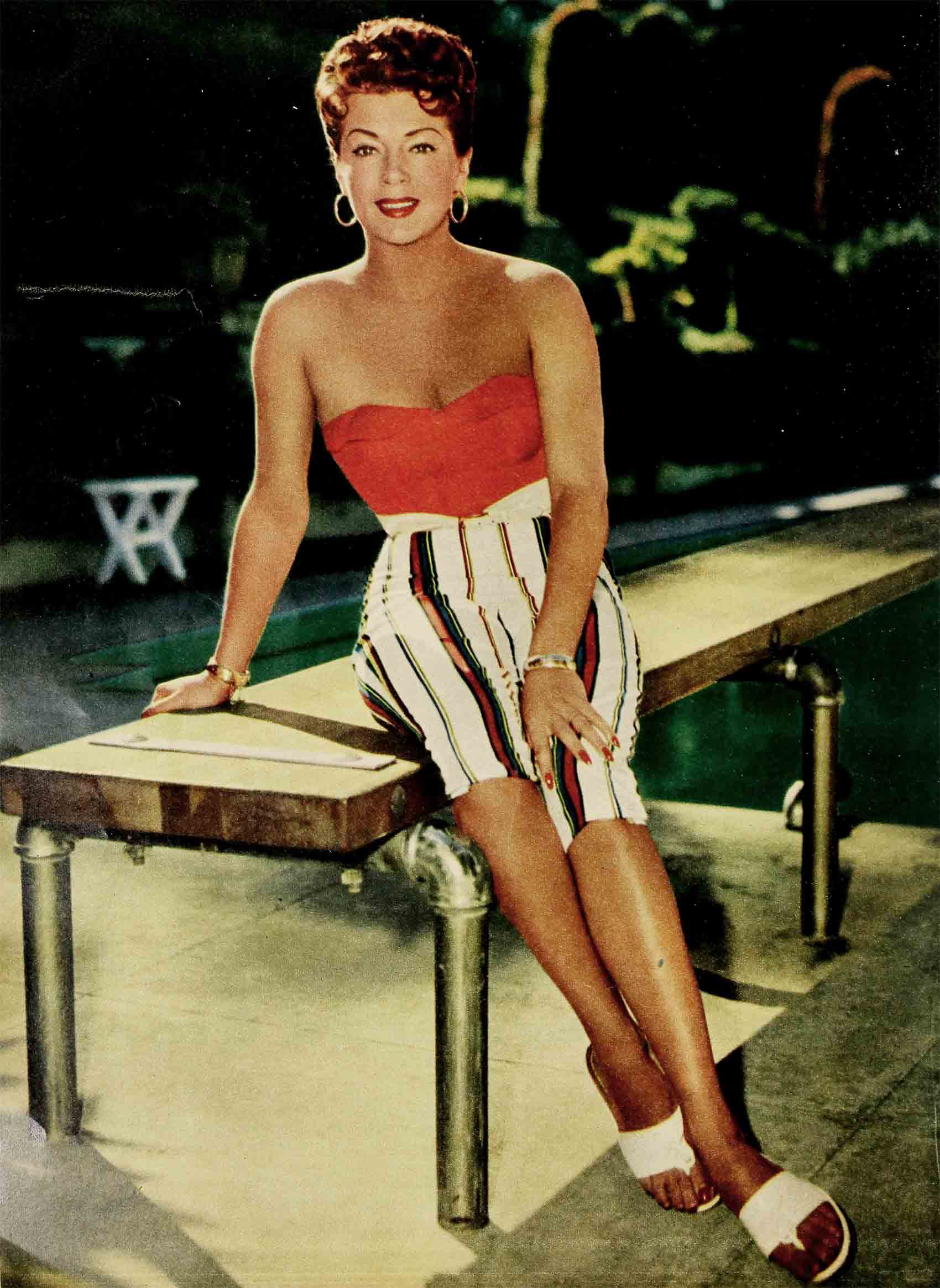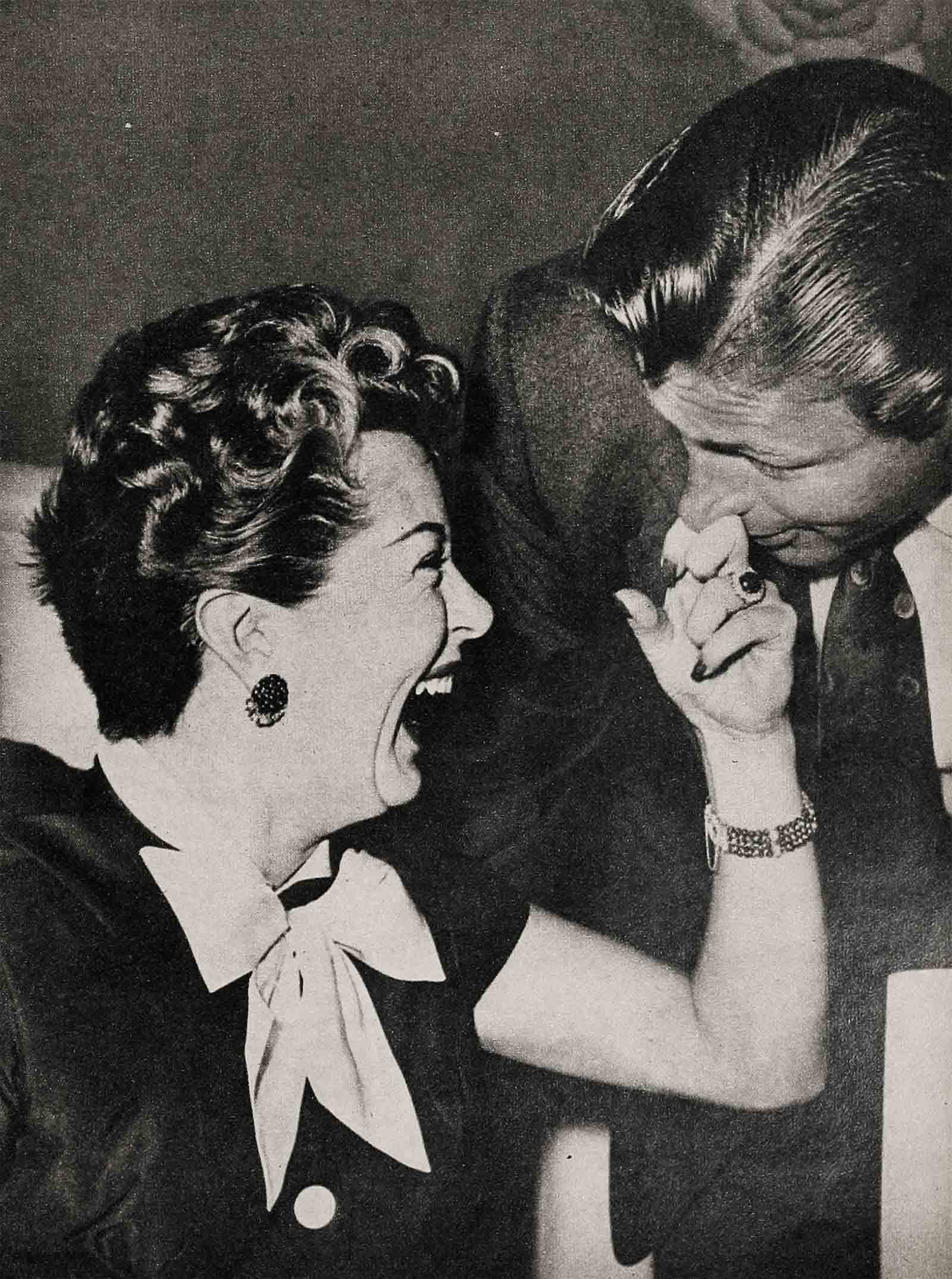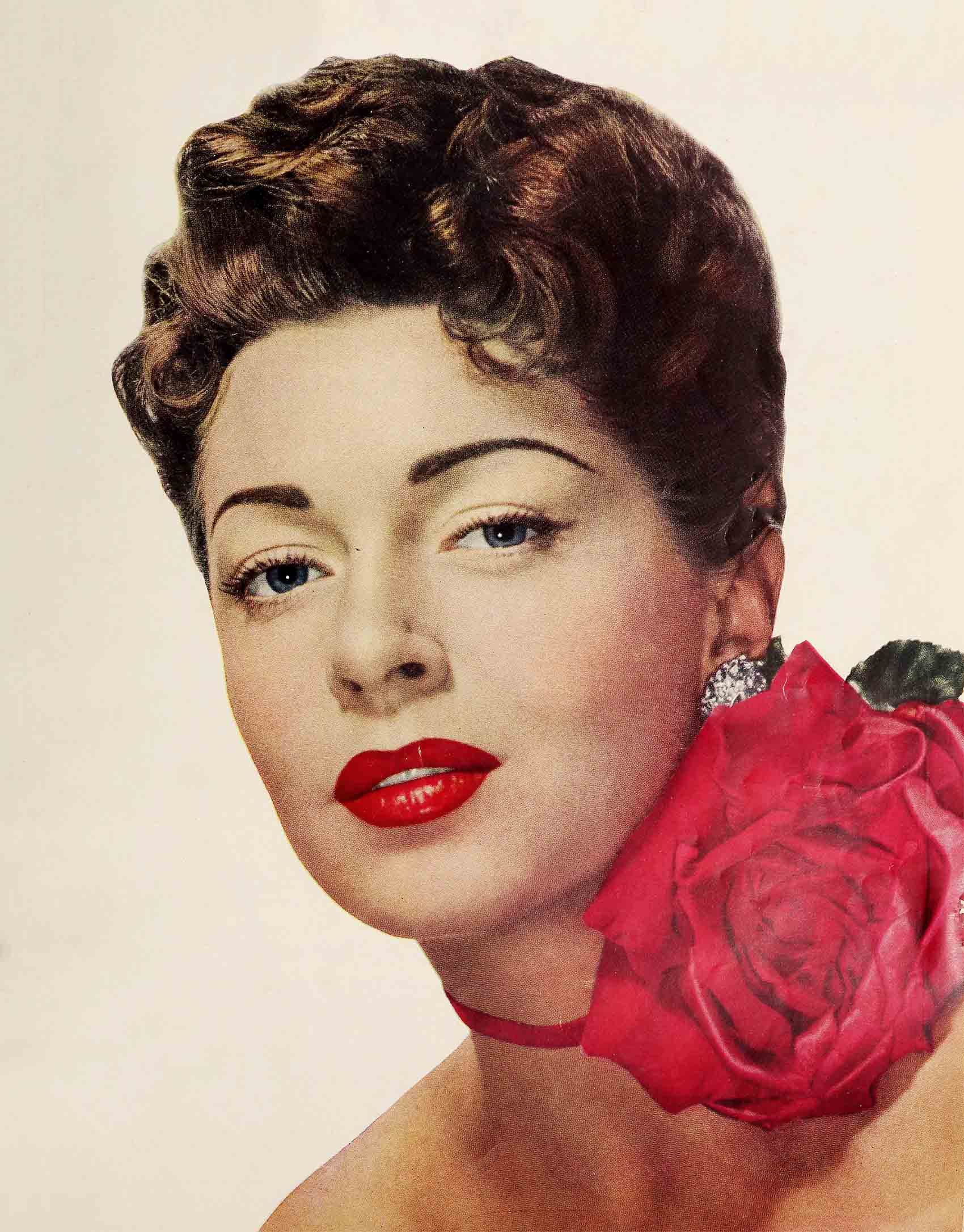
The Face Is Familiar—Lana Turner
The name of this brown-haired doll is Julia Jean Mildred Frances Turner Shaw Crane Topping Barker. You know her better as a blonde and by a briefer handle—Lana Turner. In other ways, too, you wouldn’t recognize your Lana now.
Veteran of the Hollywood bistro belt for seventeen gay and gaudy years, Lana is seldom seen in her old haunts any more. And when she does make an occasional appearance, people say, “That’s Lana Turner?”
It’s the hair. The blondeness of yore has been replaced by dark brown. It is the most controversial head of hair since Veronica Lake took half an idea from an English sheep dog and dangled her tresses over one eye.
Some people like Lana’s brown hair. Partisans include an important gent named Lex Barker, who heretofore has been expert in such matters as swinging from tree to tree and emitting loud jungle calls.
Some people hate the brown hair. These include Louella O. Parsons, who called it “mousy.” This annoyed Lana. She exclaimed, “Call it unattractive. Call it ridiculous. But not Mousy!”
Actually, Lana has changed in more ways than her hair color. Friends have remarked that she returned from Europe much happier than they had ever seen her. Once the queen of the night life, she now seems content to spend her time at home with her new husband and her daughter Cheryl.
“I never thought I could ever call Lana serene,” says an intimate. “But she actually has a serenity about her that I’ve never seen before. She used to fret about nasty things she read about herself. Now she just laughs them off.
“At long last, she seems well adjusted to the wacky life of being a legendary movie star. She’s a happy girl.”
Part of the change is due to maturity. I don’t mean that she’s pushing middle age. Lana was thirty-four on her last birthday—a surprise when you consider how many years she has been an international trademark. She started in the movie business early. She was jiggling her way through They Won’t Forget when Marilyn Monroe was learning to multiply.
But the passing of the years isn’t the only reason for Lana’s new look. Some glamour girls never grow up.
A happy marriage will do wonders for a girl’s serenity. Lana’s decision to marry Lex Barker was a considered one, but the idea did not appeal to many of her friends and business associates, some of whom seem to resent him because he is tall and handsome—and perhaps because he married Lana Turner.
One consideration, somewhat overlooked, is that Lex Barker is said to be one of those rare men whose blood is Rh negative. This is of little interest to most ladies, but Lana Turner is a negative, too. She is a devoted mother, but she has had a tough time trying to add to her, family. An Rh negative husband is a blessing the doctor wouldn’t have dared to order.

Lex has a new contract with Universal. Lana told him she wouldn’t mind if he didn’t take it. Certainly he’d do better on taxes if he concentrated on individual pictures, residuals, and such. But he took the contract because he didn’t want anyone to say he’s “living off” his wife. It isn’t so.
Lana walked in for this interview exactly on time, certainly another sign that she has changed. She was as gorgeous as ever in a grey suit studded with pearl and gold jewelry.
She did seem different. There was nothing flighty about her. She talked philosophically about her life and times, laughed about her past mistakes and was pleased with the prospect of her future. She admitted she had changed.
“I’ve been hurt, time after time,” she remarked. “Sure, I’ve heard all the stories about what I’m supposed to have done. They are fantastic! I would have had to be eight different people.
“Those stories used to upset me terribly. I would read the nasty little digs that were printed about me and stew about them until I made myself miserable.
“But now I look at it differently. There’s nothing I can do to stop those stories. So I have adopted this attitude: the only person you have to answer to is the one you face in the mirror every morning. If you can look yourself in the eye and know that you’re not guilty, you have no worries.
“I’ve tried that system and it works. Lex and I have tried to adjust our lives so we can avoid trouble. We stay home a great deal. We avoid big parties that look as though they’re going to end up in brawls. We can have a better time among our close friends. Let the others end up on the front pages. I’ve had my share.
“I don’t mind being knocked for something I do, If I make mistakes, I expect to be criticized for them. But the thing that makes me sore is having people make up things about me. That’s why I’ve always been wary of interviews. Sometimes a writer will take one brief quote out of a song statement I may have made. Out of context, the remark looks ridiculous.”
A so-called exposé magazine recently printed a scurrilous article about Lana and understandably, she was incensed. She turned it over to the studio police department for further action.
“Why do they print things like that?” she asked. How long will they be allowed to stay in business?”
Then she reverted to the new philosophical Lana and added, “Being a movie star would be a wonderful life except for all the slop that goes with it. You have to put up with a great deal for what you get in return.
“Nobody escapes it. Stay in this town long enough and you’ll hear stories about every star. Without exception. You can hear every kind of story about anyone. As soon as you get up on top, they start aiming at you.”
Of the stars who have had real troubles and some whose woes have been magnified out of all proportion by the gossips, Lana stuck up for three, especially.
“Nobody could have been happier than I when Ava Gardner got an Oscar nomination for Mogambo. She’s just about my best friend. I love that girl. She’s awfully hard to get to know; she’s a very shy person. But once she considers you her friend, you’ll find she’s wonderful. She deserves all the credit she can get.

“Judy Garland is another one of my favorites. We’re next-door neighbors; our kitchens practically look in at each other. Judy is another girl who deserves better breaks than she’s gotten. I hope her A Star Is Born is the greatest picture ever.
“I’ll tell you a girl I’d like to meet and that’s Marilyn Monroe. She must be a fascinating personality, considering all she has gone through. She’s taking a lot of knocks because she’s on top now. I wish there were some way I could tell her not to let it get her down.”
I remarked that Lana had done a pretty good job of chronicling her own life and hard times in her autobiography. “Oh, that!” she remarked. The story, which was printed in a woman’s magazine, created quite a sensation when it came out.
At the beginning of the story, Lana dropped a bomb by telling how her father was killed in a crap game at Fourth and Mission Streets in San Francisco, December 14, 1930. She went on to tell how her father had been a bootlegger during Prohibition days, how after his death she was boarded with a Modesto couple who beat her with a stick when she didn’t complete her tiring chores. She also gave intimate details of her first three marriages.
“I wish now I hadn’t done the story,” Lana confessed. “It’s not that I regretted having those matters known. All the friends who knew me were aware of the facts, and they are the ones I am concerned about.
“The damage was not in the first publication, but in the way it has been used since. Writers have taken chunks out of it and used them for their own purposes. One magazine writer really got me sore. He took the record of each of my romances and tried to prove that I had a father complex.
“Now, look! I wish I had known my father better. He died when I was only nine and a half. But I didn’t develop any complexes about it. I am a very uncomplexed girl.”
The ides of an autobiography arose when she hired an independent press agent. The writing was done by Cameron Shipp, an astute writer who had done similar jobs with Billie Burke and Lionel Barrymore.
“Cam had a mind like a vacuum cleaner,” she recalled. “I’d talk with him for two or three hours at a clip. Sometimes I would toss off an incident with a sentence or two. He’d come back to it later and say, ‘Now what about this?’
“He was very thorough. I didn’t find out until later that he even went up to San Francisco and consulted the police records to find out that my father’s death was still carried on the books as an unsolved murder. I hadn’t known that.
“When it was all done, he brought it to me to read. I sat there reading it for an hour or more and I started to get scared. It’s one thing to carry certain experiences in the back of your head; it’s another thing to see them down in black and white. I wanted to drop the whole thing, but how could I tell the man after he had worked so hard?”
She did balk, but then her publicity agent swung into action. After an hour of steady convincing, Lana agreed to go through with the deal, but with certain deletions.
The autobiography appeared and created quite a stir. MGM, which had helped to keep out of print many of the details she revealed, was understandably peeved. Her mother, who has always stayed in the background of Lana’s career, said sadly, “Why did you have to tell about those things after we’ve kept them quiet all these years?”
Lana learned her lesson. She had to continue to pay the press agent a stiff sum, but she never again did a story with him. She says she’ll never hire another publicity man.
She seemed happier to talk about more pleasant matters—her hair, her husband, her daughter and her career.
The hair: She loves it. Doesn’t care what anybody says.
“I let my hair go brown for a very simple reason: I had to do two pictures that called for it,” she remarked. “InFlame And The Flesh, I played a real earthy Italian girl. Unlike anything I’d ever done before. At the beginning of the picture, you see a shot of the seamier section of Naples. Down in the streets a big fight is going on. There are a bunch of kids scrambling and a woman screaming at them like a fishwife. She turns around and you see that it’s me. The words ‘Lana Turner’ come on the screen and the credits begin.

“Now I couldn’t very well play a role like that as a blonde. In the other picture I made in Europe, Betrayed, I’m a Dutch spy who dyes her hair.”
She said she was delighted with the privacy the new hair shade gave her. She could travel about during her ten months in Europe without being recognized by the public. Even as she spoke, men filed past the table and stared at her for a moment as if to say, “That girl looks familiar.” But they passed on, still looking quizzical.
Lana intends to keep her hair brown, regardless of the advice of some people at the studio. One or two argued that she should wear a blonde wig when she appeared on the MGM 30th anniversary show on Ed Sullivan’s TV show.
“I shouldn’t have had to point out to them that it was good business to have me appear with brown hair with these two pictures coming out,” she observed. “What better way to introduce the hair than before the millions of TV viewers?
“Personally I’m delighted with the whole situation. It’s a controversy without a scandal, What could be more ideal?”
HER HUSBAND: She’s also enthusiastic about him.
“This is quite a guy,” she said with a glow in her eyes. “Somebody was mentioning that it was nice that we were able to get to know each other well in Europe before we got married. I started thinking about it and it’s true.
“If we had stayed here, we would have been all wrapped up in the Hollywood routine and our own friends. But we avoided all that. We had only each other and the experience of seeing Europe together.
“I decided this was the man for me. And I got married in es on purpose. When you get it done over there, the marriage has to last. There’s no way out.”
I mentioned that her remark had a slightly reminiscent ring. When she married Bob Topping in a garish free-for-all at a Sunset Boulevard mansion, she was reported to have uttered the deathless remark, “This is forever.”
“Ridiculous!” Lana exclaimed. “I never said that marriage would last forever. How could I have predicted: such a thing? The man could have dropped dead. He promised he wouldn’t, but it was still possible. How can you predict anything can last forever?”
The Turner-Barker idyll may not be for the ages, but it would appear to have a better chance than her three previous entanglements. Lana has married four strong-willed men, but the last of these seems to have what it takes to keep Lana happy.
“Sure, Lex rules our house,” she admitted. “But he’s not overbearing about it. The thing about him is that he has the intelligence to back his decisions. And he has a great sense of humor. That’s very important.”
HER DAUGHTER: A source of constant amazement.
“Cheryl is only ten and a half years old but she’s five feet, one, compared to my five feet, three,” said Lana. “She’s going to be taller than I am before long, and a real beauty. Oh, how I hope she won’t be ashamed of her height! I keep telling her to walk erect and be proud of how tall she is, even if the boys are shorter.
“She gets along wonderfully with Lex. At first she was a little standoffish with him, and that’s only natural. She called him Uncle Lex, and when she wanted anything, she’d wait until she could get me alone and ask me.
“That’s all changed now. Both of them go right over my head. The two of them are conniving all the time, and I’m the last to know what’s going on. She dreamed up her own name for Lex. She calls him Po.
“I couldn’t figure out where she got that, so I asked her. She had something of a problem. She calls her own father, Steve (Crane), ‘Daddy.’ I didn’t want her calling Lex by his first name alone, because it simply riles me to hear children call grown people by their first names. It just doesn’t sound right.
“For a while it was Uncle Lex. But when she got so fond of him, she decided to call him Po. She said she took ‘Pop’ and dropped a ‘P’.”
HER CAREER: Moving in high gear.
Stars like Clark Gable and Greer Garson may be checking out of MGM, but Lana is there to stay. For another five years, at least.
Is she happy about it?
“Yes, I like Metro,” she said, “though I do wish I could be allowed an outside picture a year. There are so many exciting pictures being made and I’d like to be able to take some of the offers I’ve had. I’ve never been loaned out in all the years I’ve been at MGM.
“In fact, until the two pictures in Europe, I never got off the Culver City lot. Except that I did a few days at Laguna for The Postman Always Rings Twice and at Monterrey for Mr. Imperium.”
Lana seldom. speaks enthusiastically about her pictures, but she’s all het up about Flame And The Flesh. “It’s not a Lana Turner role at all. It’s one of the few times I’ve had a chance to really act.”
There’s just one other matter that belongs in this report on the 1954 Lana. She hopes it will have happened by the time you read this.
Lana and Lex hope it will be a boy.
THE END
—BY BOB THOMAS
It is a quote. MODERN SCREEN MAGAZINE JUNE 1954




